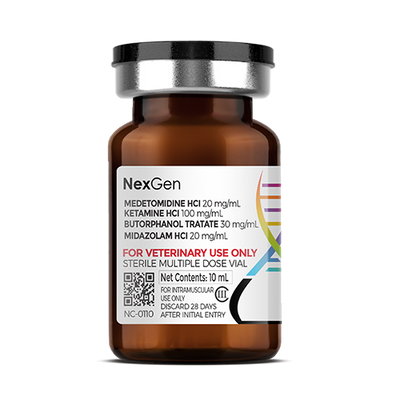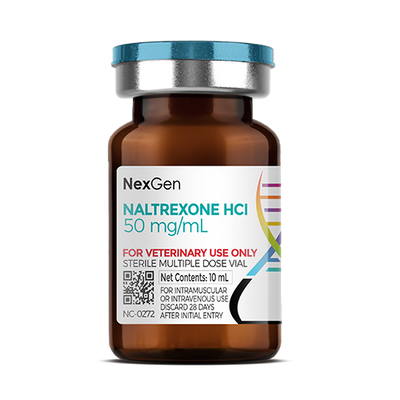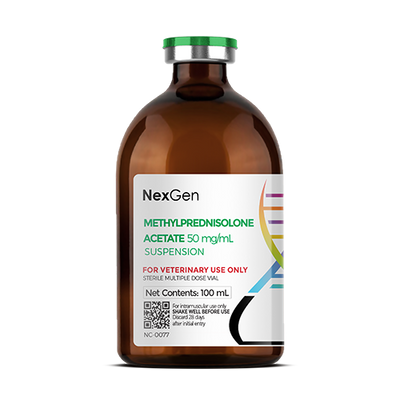
Butorphanol Tartrate 50 mg/mL, Injectable, (10mL)
Login for pricing
- Brand
- Mixlab
- SKU:
- NC-0186
- Product Type:
- Injectable
- Administration:
- Intramuscular
- Size:
- 10ml
- Controlled Substance:
- Schedule CIV
Animals in the zoo setting are similar to domestic animals in the sense that they all require regular veterinary care. Some zoo animals may be examined without any sedation, while others require full sedation in order to be evaluated. General anesthesia poses risks for larger zoo species, such as cardiorespiratory depression, myopathy, and hyperthermia. In ruminants, ruminal bloat and regurgitation of rumen contents with potential aspiration pneumonia are added risks. 1 Thus, the use of heavy sedation for zoo animals in order to perform minor procedures is justified.
Butorphanol tartrate
Butorphanol tartrate is a synthetically derived opioid agonist-antagonist analgesic of the phenanthrene series, with a potency of about four to seven times that of morphine. In the United States, it is a U.S. Drug Enforcement Administration (DEA) class IV controlled substance. Butorphanol is a mixed agonist-antagonist with low intrinsic antagonist activity at receptors of the mu1 (µ1) and mu2 (µ2) opioid type (morphine-like), which are responsible for the significant opioid side effects and also an agonist with a high affinity for kappa (κ) opioid receptors. Butorphanol is also a sigma (σ) receptor agonist, which stimulates respiratory drive. Its interactions with these receptors in the central nervous system apparently mediate most of its pharmacologic effects, including analgesia.2
In veterinary medicine, butorphanol tartrate is widely used as a sedative and analgesic in dogs, cats, horses and has been a staple medication for veterinarians in the zoo setting. Administered either via IM or IV, its analgesic properties typically take effect about 15 minutes after IM injection and last about 4 hours. For increased sedation or light anesthesia, butorphanol may be combined with sedatives such as α-adrenergic agonists (e.g., medetomidine, xylazine), tranquilizers such as benzodiazepines (e.g., midazolam, diazepam) or phenothiazines (e.g., acepromazine).2
Butorphanol tartrate has proven to be relatively safe, with a high therapeutic index, and may be completely reversed rapidly with naloxone, nalmefene, or naltrexone, or partially reversed by diprenorphine (which antagonizes only the µ opioid receptors but not the κ opioid receptors). This partial reversal of the undesirable µ opioid receptor effects (muscle tremors, tachycardia-bradycardia, gastrointestinal stasis, euphoria-dysphoria, respiratory depression) while maintaining the sedative κ effect produces some useful and safer anesthetic protocols in nondomestic species.2
Where to buy Butorphanol Tartrate
Butorphanol tartrate is available in the U.S. through several pharmaceutical manufacturers and through veterinary custom compounding companies.
FOR RX ONLY: A valid prescription from a licensed veterinarian is required for dispensing this medication.
1Bouts T, Dodds J, Berry K, Arif A, Taylor P, Routh A, Gasthuys F. Detomidine and Butorphanol for Standing Sedation in a Range Of Zoo-Kept Ungulate Species. J Zoo Wildl Med. 2017 Sep;48(3):616-626. doi: 10.1638/2016-0047.1. PMID: 28920785.
2Bush, M. et. al. The Use of Butorphanol in Anesthesia Protocols for Zoo and Wild Mammals. In: veteriankey.com. https://veteriankey.com/the-use-of-butorphanol-in-anesthesia-protocols-for-zoo-and-wild-mammals/




















